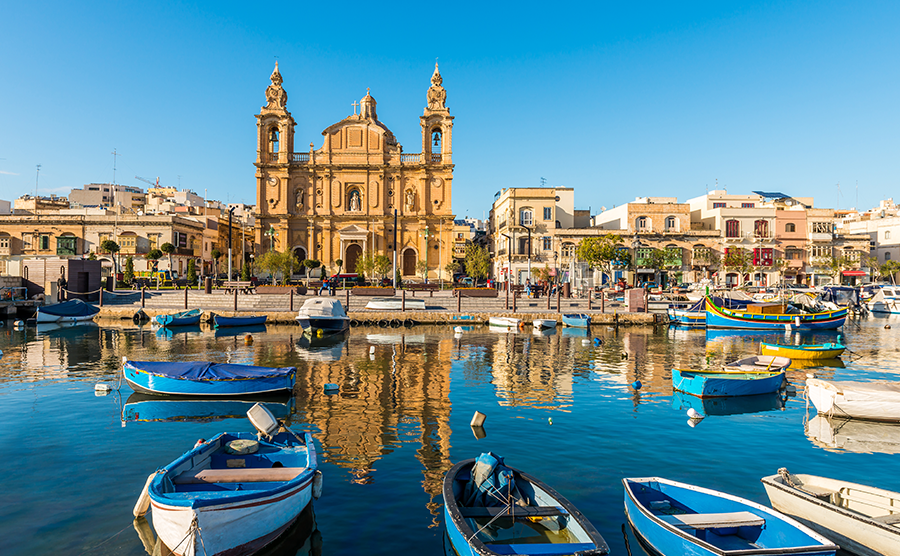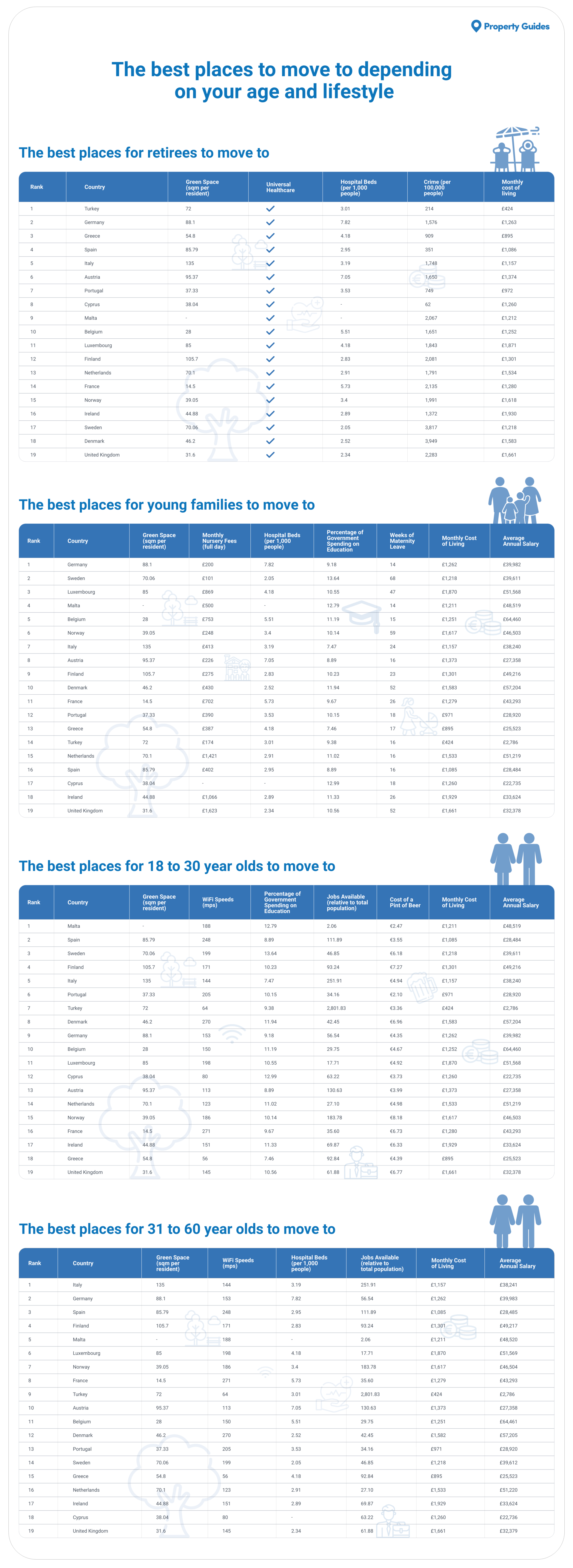Entertaining the idea of living abroad? Could you move overseas? To help you decide, discover your ideal relocation spot based on your age & lifestyle.
Whether you’ve just become parents, you’re coming close to retiring, or you’re looking for a new adventure, there are plenty of places to relocate – particularly if you’re looking to broaden your search overseas!
But, how do you know which country is best for you and your life stage?
For those looking to escape the UK, it’s important to make sure that the next place you choose to call home is right for you and your family.
So, to help those who are weighing up their options and potentially looking to move abroad in the near future, we have analysed some of the most popular expat destinations across Europe to reveal the best places to move to depending on your age and lifestyle.
Key findings
- Turkey is the best place for retirees to move to
- Germany is the best place for young families to move to
- Malta is the best place for 18-30s to move to
- Italy is the best place for 31- 60s to move to
The top location to move overseas for retirees

The most famous sights of Istanbul, The Blue Mosque and Hagia Sophia, Turkey
From our research, we found Turkey is the best place in Europe to move to from the UK if you’re retired or looking to retire soon.
How did we come to this conclusion?
We looked at:
- The amount of green space (square metre per resident) in cities
- The option for universal healthcare
- The number of hospital beds per 1,000 people
- The crime level (incidents of theft per 100,000 people)
- The cost of living
Turkey’s great benefit is boasts the lowest cost of living in Europe. At an average of £422 (€488,40) a month, your pension will go at least four times further than the UK where the equivalent cost of living would be £1,652.79 (€1,913.01), Even better, Turkey may be outside the EU but it is a country where your UK pension WILL be uprated each year, like in the UK, with the ‘triple lock’. You’ll feel safe in Turkey too. Crime levels are low, with only 214 records of theft per 100,000 people..
The second-best place for retirees to move to is Germany, with each resident having 88.1 square metres of green space, it’s the perfect location for nature lovers and those who want to spend their new-found free time outdoors. Also, Berlin has the highest number of hospital beds per 1,000 people across all countries we’ve analysed.
Greece has been revealed to be the third-best place for retirees to move to in Europe. For those retirees looking to protect their savings and retirement fund, Greece has the second lowest cost of living out of the locations that we’ve analysed, with an average monthly cost of living of £894.69 (€1,027.92).

Would you consider buying property overseas to retire to?
The top 10 countries for retirees to move to
1.Turkey
2.Germany
3.Greece
4.Spain
5.Italy
6.Austria
7.Portugal
8.Cyprus
9.Malta
10.Belgium
Find your dream home on our property portal
The best destinations for young people and families
Germany came out as the top location for young people and families looking to buy overseas property.
To determine this, we’ve taken into account the following data points:
- The amount of green space (square metre per resident) in each capital city
- Average monthly nursery fees
- The number of hospital beds per 1,000 people
- Government spend on education
- Mandatory maternity leave terms
- Average cost of living
- Average annual salary.

Compared to all of the countries analysed, Germany has the highest number of hospital beds per 1,000 people, with there being 7.82 hospital beds per 1,000 people. This means that when expecting parents are going into hospital during labour, there should be hospital beds readily available.
When it comes to green space, there are over 88 square metres per resident in Germany, which is great for young families who want to spend time outdoors participating in sport, or simply spending time outside with friends and family.
Following Germany, the second-best place for young families to move to is Sweden. In fact, Sweden comes out on top when it comes to the percentage of government spending that goes towards education, with an incredible 13.64% of government spending in the country going towards it.
The third-best place for young families to move to is Luxembourg, which has the third-highest average annual salary of all the countries that we’ve analysed. The average annual salary in Luxembourg is £51,537 (€59,200).
The top 10 countries for young families to move to:
1.Germany
2. Sweden
3. Luxembourg
4. Malta
5. Belgium
6. Norway
7. Italy
8. Austria
9. Finland
10. Denmark

Small harbor and baroque church in Sliema, on the island of Malta
The best location for 18-30 year olds
Malta has been revealed as the best place for 18-30 year olds to move to.
To determine this, we looked at the following data points:
- The amount of green space (square metre per resident) in each city
- Average Wi-Fi download speeds
- Government spend on education
- The number of jobs available per person
- The average cost of a pint of beer
- The average cost of living (per month)
- The average annual salary
Throughout Malta, the average Wi-Fi speeds sit at 188 Mbps, which is considerably faster than the UK.
On top of this, Malta’s government spend on education is the third-best across the European countries we analysed. The Maltese government spends 12.79% of funds on education, which is significantly higher than the 10.56% that the UK government spends on education.
For those interested in living somewhere with good nightlife, Malta is perfect. We’ve looked at the average cost of a pint across in Europe and found that the cost of a pint in Malta is £2.15 (€2.46). This makes it the second-cheapest place for a pint across the European countries that have been analysed, making it the perfect place for people to enjoy a tipple without breaking the bank.

The digital nomad concept is becoming increasingly popular with young people
The top 10 places for under 30s to move to:
1.Malta
2. Spain
3. Sweden
4. Finland
5. Italy
6. Portugal
7. Turkey
8. Denmark
9. Germany
10. Belgium
Find more information about buying property overseas on Your Overseas Home
The number 1 location for 31-60 year olds
Italy has been revealed to be the best place for those between 31 and 60 years old to move to.
To determine this, we’ve taken into account the following data points:
- The amount of green space (square metre per resident) in each city
- Average Wi-Fi download speeds
- The number of hospital beds per 1,000 people
- The number of jobs (relative to population) on LinkedIn
- The average cost of living (per month)
- The average annual salary

Small town Atrani on Amalfi Coast in province of Salerno, Campania region, Italy.
Browse homes for sale in Italy today
Italy’s capital city, Rome, has over 250 jobs (relative to population) on LinkedIn currently hiring, positioning it as the second-best European capital city for potential jobs. This also makes it the perfect location for those who want to advance their career once they’ve moved to Italy.
When it comes to green space, Italy has the largest amount of green space out of the European countries analysed, with 135 square metres of green space per resident.
Following this, the cost of living in Italy is lower than the UK, sitting at £1,158.76 (€1,327.04) per month, which is 40% lower than the UK’s cost of living (£1,652.79/€1,913.01), meaning that those moving there may be able to enjoy life a little bit more with a higher disposable income than they’d have in the UK.
The top 10 places for those between 31 and 60 to move to are:
1. Italy
2. Germany
3. Spain
4. Finland
5. Malta
6. Luxembourg
7. Norway
8. France
9. Turkey
10. Austria
Full results

Our findings
Methodology
In order to reveal the best places to move to depending on your age, we have ranked 19 European countries and their corresponding capital cities on a range of data points. Capital cities were analysed to ensure consistency across the data points.
The 19 countries were chosen based on their general popularity with British expats, according to Property Guide’s experience and expertise.
We used a range of sources, all of which are listed below, to find the data. These data points were then split and assigned to one (or more) of the age bracket/lifestyle breakdowns, depending on their relevance. For example, nursery fees and the number of jobs available will not be applicable to retirees in most instances, but it will be relevant to young families.
Definitions of the data points we studied:
- Amount of green space (square metre per capita)
Green space has been taken into consideration due to its importance to all age groups. The ability to access large amounts of green space means plenty of opportunities for socialisation, exercise and time outdoors, which is needed by each and every individual. - Wi-Fi download speeds
Wi-Fi speeds are relevant to all age categories, as most people are digitally active in some way. Having strong Wi-Fi speeds means that people will have access to not only entertainment, but also education and work/employment. - Options for universal healthcare
Universal healthcare is something that many people living in the UK take for granted, therefore, we believe it’s important to see which countries provide universal healthcare. For those above the age of 60, planning on having children, or raising a family, healthcare options are particularly important. - Monthly nursery fees (for full days in a private nursery)
Nursery costs for full-time care allow us to see how accessible childcare is for young families who are looking to move to another country. However, if a country has a high salary and low cost of living, higher nursery costs won’t have such a negative effect on finances. - Hospital beds available (per 1,000 people)
Looking at the number of hospital beds per 1,000 people allowed us to judge the state of healthcare in each country. For people who have long-term healthcare needs or have families to look after, a higher number of hospital beds suggests better preparedness for health emergencies, shorter wait times for treatments and potentially superior healthcare services. - Amount of crime (theft per 100,000 people)
Crime rate is a strong indicator of how safe an area is, being particularly important for retirees and young families. Parents want to feel comfortable allowing their children to play in their local area without any worry of crime happening around them. On top of this, retirees and older people are often more vulnerable members of the community, and therefore low crime rates will be extremely important for them. - Government education investment (per cent of government spending on education)
Government investment into education often correlates with the quality of educational institutions and resources in a particular country, which can affect both those pursuing further studies or considering their children’s education abroad. - Weeks of maternity leave allowance
The amount of time women get as part of maternity leave varies from country to country, and it’s very important for future parents to make sure that they’re aware of their maternity leave allowance when they’re emigrating. Many prospective parents will want to ensure that their finances and childcare plans are in place, and understanding maternity leave helps with this. - Amount of jobs on LinkedIn (relative to population)
The number of jobs available on LinkedIn give a good indication of how strong the job market is and, therefore, how easy or difficult it will be to find employment in your new country. - Nightlife (average cost of a pint of beer)
Socialising and enjoying leisure time are important aspects of life, particularly for most 18-30 year olds. Affordable alcohol prices can be a good indicator of how easy it is to afford social activities in a location. - Monthly cost of living
The average cost of living in each country is extremely important to consider for all age brackets. If the cost of living is high, then people are either going to have to ensure that they’ve got a good pension or savings to live off, or that they’re able to secure a high-earning job to help tackle the high cost of living. - Average annual salary
Average annual salary is a strong indicator of how much each worker will be able to earn in the country they move to, and as already mentioned, if a country has a higher cost of living than people are used to, a higher salary will help with this.
Once all of the data was collected, each data point was marked on a unique rank system, with the lowest rank (1) going to the best data point, and the highest rank (43) going to the worst data point. These numbers were then averaged out across each data point to reveal the final ranking order for each country.

